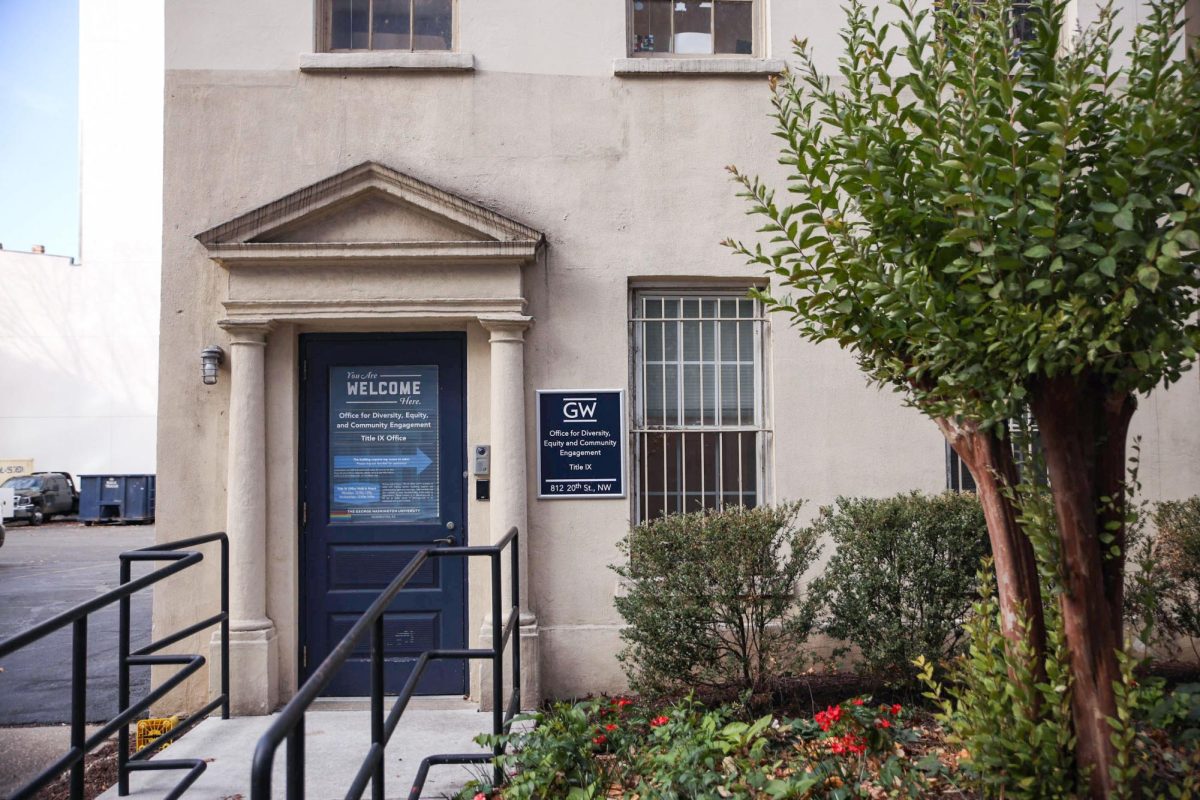The Title IX Office and Student Government Association late last month opened applications for a peer adviser program set to launch next fall to support students involved in Title IX cases.
The program will grant students undergoing Title IX processes the option to select a peer adviser from a pool of trained students and alumni who can attend hearings with the student, provide emotional support and discuss Title IX Office resources. The application for students to apply to become an adviser opened in late November and will remain open until Dec. 17, when officials will begin the selection and interview process for the program.
Assistant Provost and University Title IX Coordinator Asha Reynolds said the program will supplement the current Title IX policy that allows students to select their own adviser or receive a GW-appointed adviser to provide more peer-to-peer support throughout the Title IX process.
If a student can’t find an adviser or doesn’t want to select their own, the University can provide an adviser free of charge, according to the Title IX website. Reynolds said the advisers the University appoints to students are typically attorneys with “substantial” Title IX knowledge who provide students free information on Title IX processes and investigate cases for students.
“Volunteer advisers will offer an added layer of support to members of the GW community who are impacted by sexual harassment,” Reynolds said in an email.
Reynolds said prospective candidates are required to submit a resume and letter of interest, and if selected, will undergo an interview process with Title IX officials. She said officials will hold training sessions for the selected volunteer advisers on GW’s Title IX policy, offer on-and-off-campus support resources and trauma-informed care so they can accurately assist students undergoing Title IX processes.
Reynolds said the Title IX Office will continuously request feedback from students who receive a volunteer adviser to actively assess whether they are providing sufficient support to parties.
Reynolds said the selected advisers will sign a “privacy agreement” with the University and with the student who selects them to act as their adviser to ensure information about the Title IX case remains confidential. She said people accepted into the program must commit to serving in the role for a minimum of one year to ensure students can work with the same adviser for the duration of their case.
Current Title IX privacy policy states that filing a report with the Title IX Office is not entirely confidential, as case details are shared with a “limited circle” of University employees and Title IX Office staff members who discuss how best to move forward. The office offers a list of confidential, third-party resources that people involved in cases can reach out to, including the Sexual Assault and Intimate Violence Helpline and clinicians at GW Counseling and Psychological Services.
SGA President Ethan Fitzgerald said the Title IX Office permits students to bring an adviser of their choosing to hearings under current Title IX procedure, but the program will give students who don’t have someone they feel comfortable confiding in another option for support. He said the adviser program can also provide a third-party student adviser to students who don’t feel comfortable sharing details of their case with their friends.
“This is really to help students who maybe don’t have someone they can turn to, or maybe even if they do, don’t feel comfortable bringing someone who’s so close to their life or who might know the other person that’s related to the case,” Fitzgerald said.
Fitzgerald said the SGA’s idea for the program stemmed from conversations between the SGA’s executive branch and Title IX officials, like Reynolds and Assistant Director of Sexual Assault Prevention and Response Beth Riley about expanding peer-to-peer support for students involved in the Title IX process. He said Title IX respondents and complainants may feel more comfortable sharing their experiences with a peer than an adult who may not understand their perspective as well.
“With a pool of trained advisers, it’s a peer who is also a college student who is your age, who knows how to talk to you about these issues,” Fitzgerald said.
Fitzgerald said the University “finalized” the questions for the application and will conduct an internal selection and interview process next semester to select the pool of advisers. He said the SGA helped craft questions for the application and is advertising the program through the body’s Instagram.
The University will hold a series of training sessions where selected advisers will sign confidentiality agreements, learn about GW’s Title IX proceedings and review a handbook the Title IX Office created for the program to train advisers on GW-specific policies, Fitzgerald said. He added that there is not currently a set number of advisers that officials will admit into the program.
Jennifer Locane, the SGA executive secretary for graduate affairs and a second-year graduate student, said she met with Fitzgerald and SGA Vice President Ethan Lynne in July to discuss her ideas to include students and alumni advocates in helping individuals through the Title IX process. She said she had learned in her studies in the Clinical Rehabilitation Counseling program at GW about how peer-to-peer support can benefit the individual seeking support and the advocate by fostering a meaningful relationship.
Locane said the addition of peer advisers into the Title IX process will allow GW to become a more “engaged” community by strengthening avenues for peer-to-peer support between students on campus.
“Having the opportunity to regain control by choosing who will help to personally support an individual through this emotional process can be healing in and of itself,” Locane said.





